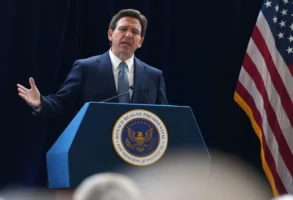Published June 14, 2016
The times they are a changin’. Atheists are on the march (literally), while the traditionally religious are in a defensive crouch. Bernie Sanders has broken the taboo on socialism, as a new generation questions the legitimacy of free enterprise. Freedom of speech, that most fundamental and cherished American liberty, is endangered in unprecedented ways. And a presidential candidate who wants to make America great again has what even his defenders might concede is a limited grasp of the constitutional underpinnings of that greatness. In sum, America as we’ve known it seems lately to be slipping away. I think I know an important part of the reason why: bad history.
America’s founders understood themselves to be reviving something that had been lost for millennia: republican democracy. Educated in the classics, the founders knew well the fates of Athenian and Roman democracy, and they dreaded another fall. Thomas Jefferson especially, and the other founders as well, believed that education would be the surest safeguard of America’s liberty. The Constitution by itself, they knew, would not be enough. Only knowledge of the history of liberty and the reasons for its periodic loss would inspire the public with the knowledge and desire to protect America’s freedoms.
But what if education itself were to turn against liberty? In that case we would be lost.
An extraordinary new report authored by historian David Randall of the National Association of Scholars (NAS), “The Disappearing Continent,” suggests that this is what may be happening to us. At one level, The Disappearing Continent is a devastating critique of the College Board’s newly-issued curriculum for its Advanced Placement European History (APEH) course. That course is the closest most Americans will come to a class in what used to be called Western Civilization. And the new curriculum will shape textbooks, and the way in which all high school and college students are taught about our Western heritage for years to come.
Rightly understood, however, the NAS report also provides a profound explanation for today’s cultural and political headlines: the rise of secularism and the discrediting of religion; debunking hostility toward economic and political liberty; the rise of a soft form of Marxism; and the undermining of Western exceptionalism in a way that leaves even the West’s would-be defenders bereft of resources to make a stand. The contours of our education have become the contours of our politics.
The history of Europe, of course, is particularly important because it is our history. To make sense of American Catholicism, you need to understand the history of medieval, Renaissance, and modern European Christianity. American Protestantism rests on the achievements of Luther, Calvin, Wesley, and a host of other continental reformers. American democracy is rooted in the history of European and especially British liberty, including the long struggle for parliamentary democracy, the writings of Hobbes and Locke, and the tradition of English common law. Economic liberty has roots in the achievements of the Industrial Revolution and the writings of Adam Smith.
Incredibly, however, as the NAS Report establishes in devastating detail, APEH omits, minimizes, or subtly undermines all these core themes of Western history. APEH skips medieval Christianity entirely and “fails to convey the actual content of even the most basic developments in Reformation theology,” while reducing religion to a mere instrument of political power.
APEH also barely mentions the history of European liberty, and minimizes the history of Britain in particular, although Britain is the traditional focus of American interest in Europe’s history. When discussed at all, British parliamentary democracy is treated as little more than a tool of class interests. APEH also “minimizes the role that Britain’s political, economic, and social liberty played in fostering the Industrial Revolution.” The new curriculum likewise plays up the alleged failings of free enterprise at every turn, and has virtually nothing to say of Europe’s great inventors and entrepreneurs.
What is going on here? I’ll give you a hint. The College Board’s new AP European History curriculum minimizes both the revolutionary violence of the Socialist tradition and the brutality of the Soviet regime. While APEH strains to make free enterprise look as bad as possible and rightly condemns the cruelties of slavery, it obscures the evil and dysfunctionality of Communism. While APEH offers a debunking class-based analysis of English Parliamentary democracy, it embraces the most questionable self-descriptions of Marxism and adopts a troubling stance of moral equivalence toward the Western and Soviet blocks of the Cold War. While APEH paints religion in a negative light, it minimizes or passes over not only the Soviet Union’s atheistic hostility to religion, but also the broader and often murderous European tradition of leftist anti-clericalism.
In short, as the NAS puts it, “APEH follows modern progressive historians’ soft-Marxist interpretation of the history of Europe, which works to justify modern progressivism’s soft-Marxist political action in the present…APEH shreds European history to serve today’s progressive agenda.”
It’s often said that millennials support Bernie Sanders because they don’t really know what socialism is and haven’t been properly taught its frightening history. That’s true insofar as it goes, but we need to say more.
Through the new AP European History framework and its other AP curricula, the College Board is providing the leftist professoriate with the means to gain control of our high-schools. Yet it’s important to realize that this “new” high school curriculum merely enshrines an orthodoxy that’s been taught at the college level for decades. If students don’t know the truth about socialism, it’s not because they’re lazy but because their teachers don’t want them to know. And although APEH avoids clear explanations of what socialism is and has done, the entire framework operates on “soft-Marxist” premises. This is what the debunking analyses of religion and liberal democracy as tools of power and class interest are all about. So the millennials have been primed to accept neo-Marxist attacks on “systemic oppression” and the free speech of the “privileged,” even without having been taught very much about socialism per se. Millennials, in other words, have been trained to view past and present through a soft-Marxist lens.
The damage goes far beyond socialism-infatuated millennials. The core liberal democratic idea that individual rights do and should trump race, ethnicity, and sex has been under assault for some time by the sort of left-multiculturalism enshrined in the College Board’s new curricula.
And what of those who resist the leftist pull? The Tea Party was inspired by respect for our constitutional system, but where does anyone go to learn about that now? Even the least progressive AP U.S. History textbooks are somewhere on the left side of the political spectrum. The strongest adherents of traditional American history and constitutionalism have taken to private- or home-schooling, excellent-but-outlier colleges, and teaching techniques that eschew textbooks in favor of reading presidential speeches and other original documents from American history.
These are excellent alternatives, yet the greater part of high school and college students have been without proper resources for the study of American history for some time. Even in “red states,” many American history teachers tend to favor leftists like Howard Zinn, and the new progressive orthodoxies. Is it any wonder, then, that even for voters who want to restore American greatness, the Constitution seems less central to the project than before?
Is anyone—right or left—now learning the history of liberty’s rise and fall in a way that Jefferson and the founders might recognize? And will even that remnant survive the College Board’s curriculum takeover? Multiple AP classes are now expected of any student hoping to attend top-ranked colleges.
Yet there is a way around the College Board’s ideological monopoly, and it’s not mysterious. As The Disappearing Continent puts it, America needs a choice. The remedy for the College Board’s curricular bias, says NAS, is “to restore variety, choice, and accountability to secondary education in America by developing one or more competitive alternatives to the College Board’s AP testing program.”
Last year the College Board attempted to forestall such competition by producing a revised version of its controversial, hyper-leftist 2014 AP U.S. History curriculum framework. I’ve argued at length that this supposed fix was illusory: that American exceptionalism has not in fact been incorporated into the new AP U.S. History framework, that even the revised framework is deeply flawed, and that in any case none of the textbooks or other course materials for AP U.S. History have been changed since they turned so sharply left. In short, the AP U.S. History revision was little more than a publicity stunt designed to parry criticism without making substantial changes.
The NAS has been the leading force in the national debate over the College Board’s new curriculum, firmly but fairly pressing the case for the importance of core Western values. In keeping with that, NAS set out to test the sincerity of the College Board’s professed efforts to meet its traditionalist critics halfway by evaluating the new AP European History curriculum. The result is the withering critique of The Disappearing Continent. As the NAS report puts it: “The College Board’s persisting progressive distortion of history substantiates concerns that the 2015 APUSH revisions do not represent a genuine change of direction, but only a temporary detour in the College Board’s long march to impose leftist history on the half a million American high school students each year who prepare themselves for college by taking APUSH or APEH.”
Once the College Board has finished producing detailed curricula for all of its AP courses, we will have arrived at the endpoint no-one openly admits to wanting: a leftist national curriculum. The only way to block this is by creating a competing educational testing company advised by the best traditionalist scholars and capable of authorizing alternative curricula and textbooks. For those dissatisfied with America’s current direction, there is no better way to begin the task of cultural reconstruction than this.
I’ve only been able to summarize the fascinating takedown of the College Board’s new AP European History curriculum by The Disappearing Continent’s author, historian David Randall, but do yourself a favor. For fun, and for the kind of enlightenment the Founders would have appreciated, try reading The Disappearing Continent yourself.
Stanley Kurtz is a senior fellow at the Ethics and Public Policy Center. He can be reached at [email protected]








